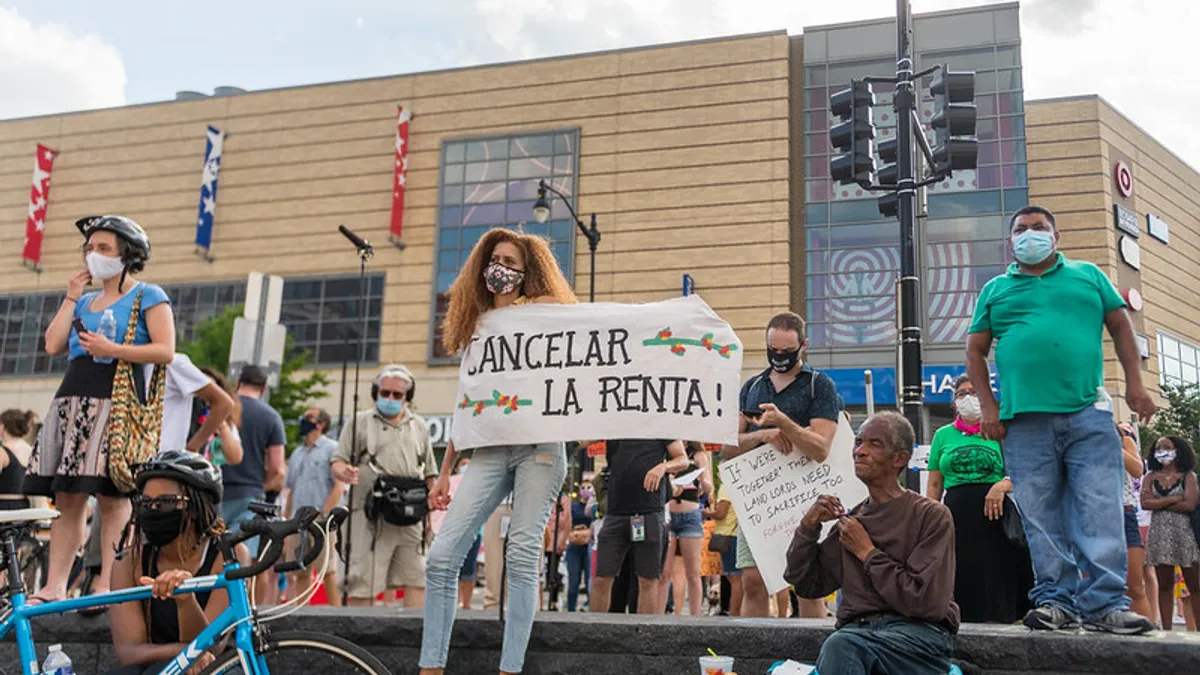Dive Brief:
-
Thirty-one percent of Black renters reported they were unable to pay rent in July compared to 28% of Latinx renters and 14% of White renters, Rep. Maxine Waters, D-CA, said during a Friday virtual town hall hosted by the Congressional Black Caucus.
-
Thirty to forty million people, or 29-43% of renter households, could be at risk of eviction by the end of the year, and people of color are most at risk of being evicted during the pandemic, she said.
-
Black households are disproportionately bearing the brunt of COVID-19, according to Waters. "Going into the current crisis, Black households disproportionately rented their homes compared to White households; experienced disproportionate rates of rent burden; tended to have fewer savings and were more likely to work low-wage jobs. All of which have made Black households more vulnerable," she said.
Dive Insight:
Communities of color, particularly Black households, have been disproportionately affected by the current rent and eviction crisis.
Black and Latinx people represent 80% of people who face eviction, according to a report by the National Low Income Housing Coalition.
Over 25% of all renter households spent over half of their income on rent each month when the pandemic began. And as a growing number of people file for unemployment insurance — 50 million since August — and eviction moratoriums lift across the country, more renters are becoming increasingly vulnerable.
"The rent must be paid," Rep. Al Green, D-TX, said during the town hall.
In Texas, 35.7% of adults reported they had missed their previous housing payment or had little confidence they would make the next one, Green said. The City of Houston recently allocated $15 million to a payment assistance program to help renters, but the fund ran out of money in 90 minutes due to demand, according to Green.
Milwaukee is another city where renters are struggling to stay afloat amid the state’s lifted eviction moratorium in late May. Shortly after the moratorium ended, the city of nearly 600,000 residents saw a 17% increase in the average number of eviction cases, with 978 of the month’s 1,447 evictions occurring in mostly Black neighborhoods.
Evictions were also up 24% across the state in June 2020 compared to the year prior, Law360.com reports.
"Eviction is not a solution, it's a problem," Matthew Desmond, sociologist and assistant professor at Princeton University, said on a July webinar. Eviction isn't just a condition of poverty, it's a cause of poverty and a cause of homelessness."
The impending wave of evictions is "entirely preventable," according to the National Low Income Housing Coalition (NLIHC). The group urges Congress to provide $100 billion in rental assistance alongside a national eviction moratorium.
Waters introduced such a bill, The Emergency Housing Protections and Relief Act of 2020, which was passed by the House of Representatives in June. The act allocates $100 billion for rental assistance and creates a $75 billion fund for homeowners that would extend an eviction moratorium through March 2021. The bill has since been received in the Senate, but is not expected to pass.












